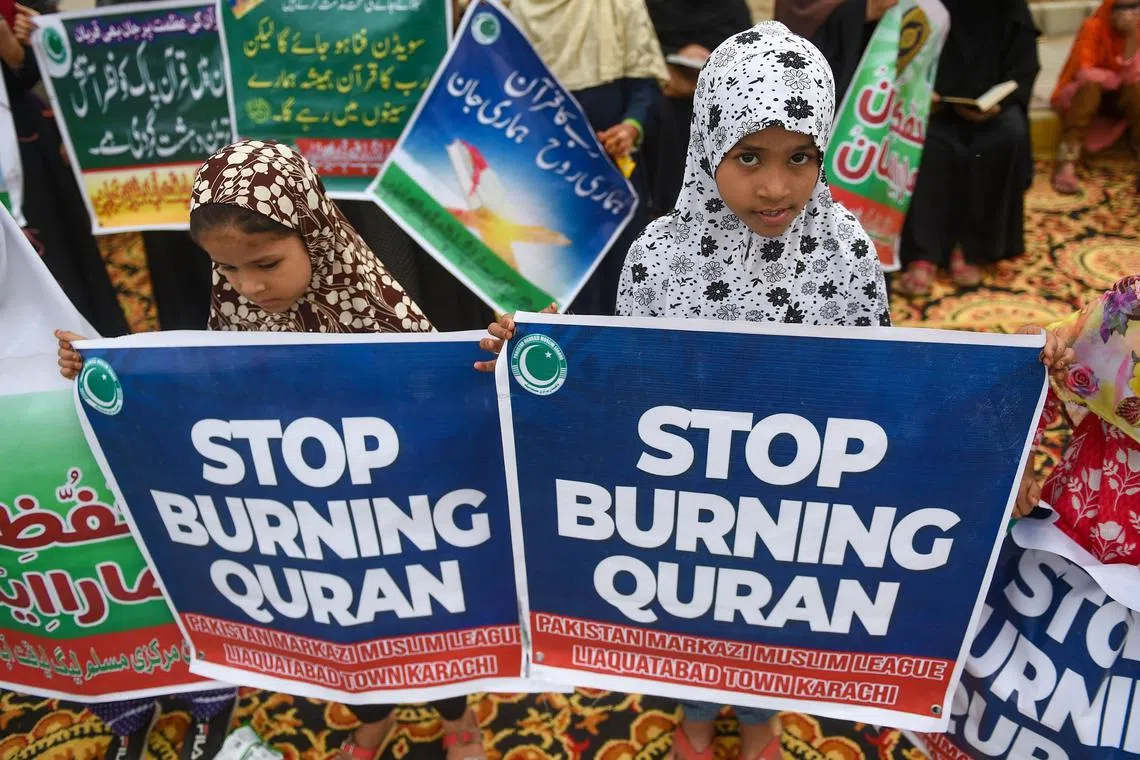Sweden boosts border controls after Quran burnings
Sign up now: Get ST's newsletters delivered to your inbox

The Quran burnings in Denmark and Sweden have prompted outrage in Muslim countries and demands that it stops.
PHOTO: AFP
Follow topic:
COPENHAGEN/STOCKHOLM – Threats to Sweden have increased after recent Quran burnings, the country’s government said on Tuesday, adding that it had strengthened border controls to give police wider authority to stop and search people as a result.
A new law, effective from the start of August, gives police extended powers to perform checks on and around the country’s borders, including body searches, and allows for increased electronic surveillance.
“Border controls are a measure that gives us the conditions to identify people coming into Sweden who could represent a threat to security,” Justice Minister Gunnar Strommer told a news conference.
Sweden and Denmark have seen a string of protests in recent weeks in which copies of the Quran were burned or otherwise damaged, prompting outrage in Muslim countries and demands that the Nordic governments put a stop to the burnings.
More Quran burnings took place on Monday and both countries said they were examining ways to limit such acts in a bid to de-escalate tensions.
Danish security police said on Monday, that like in Sweden, the country is seeing an elevated risk of attacks.
On Tuesday, Swedish Prime Minister Ulf Kristersson said the situation was “dangerous”, “complicated” and “used by people who wanted Sweden harm”, including by Russia, which may be using the situation to its advantage.
“It may be to prevent a Swedish Nato accession,” Mr Kristersson told the news conference.
Sweden applied to join Nato in the wake of Russia’s invasion of Ukraine, but the application is yet to be ratified by the Turkish Parliament.
Turkish President Recep Tayyip Erdogan has said he would work to get Sweden’s application approved, but also warned it would not happen as long as copies of the Quran were being burned.
Mr Kristersson said that it is important to de-escalate the situation and urged people to use freedom of speech responsibly and respectfully.
The Swedish government is also looking into changes that could allow police to stop Quran burnings in public if they pose a threat to national security, the Prime Minister said.
Still, he added, sweeping changes to freedom-of-speech laws are not on the table.
“We stand up for the Swedish freedom of speech,” said Mr Kristersson.
Swedish Foreign Minister Tobias Billstrom said on Monday that he has sent letters to all 57 countries in the Organisation of Islamic Cooperation (OIC) to explain Sweden’s right to assembly, and condemned Islamophobic acts.
OIC secretary-general Hissein Brahim Taha called on Sweden and Denmark to prevent Quran desecration and “expressed his disappointment that no measures were taken in this regard so far”, the Jeddah-based body said in a statement after the opening session of an extraordinary meeting on the issue on Monday.
“It is unfortunate that the concerned authorities claiming freedom of expression continue to provide licence to repeat these acts contrary to international law, and this leads to a lack of respect for religions,” Mr Taha said in remarks during the meeting.
After the meeting ended, the OIC said Mr Taha will lead a delegation to the European Union to urge officials there “to take the necessary measures to prevent the recurrence of such criminal acts under the pretext of freedom of expression”.
It also called on United Nations Secretary-General Antonio Guterres to appoint a special rapporteur on combating Islamophobia.
Around the time Mr Taha was speaking on Monday afternoon, two men set the Quran alight in the latest such protest in Stockholm.
One of the men, Sweden-based Iraqi refugee Salwan Momika, also burned pages of the Quran outside Stockholm’s main mosque in late June and, in July, stomped on the Quran outside the Iraqi embassy.
In Denmark, far-right group Danske Patrioter last week posted a video in which a man is seen desecrating and burning what appears to be the Quran and trampling an Iraqi flag.
The incidents have stoked unrest in Iraq, where hundreds of demonstrators stormed the Swedish embassy in July and set fires within the compound.
The Danish Refugee Council has said its office in the southern Iraqi city of Basrah came under “armed attack” in response to the Danske Patrioter video.
Governments across the region have also expressed their outrage. Iraq expelled Sweden’s ambassador, and Iran said it will not allow a new Swedish ambassador into the country. Saudi Arabia has in recent weeks summoned Swedish and Danish diplomats to deliver protest notes denouncing “disgraceful” acts against the Quran. REUTERS, AFP

